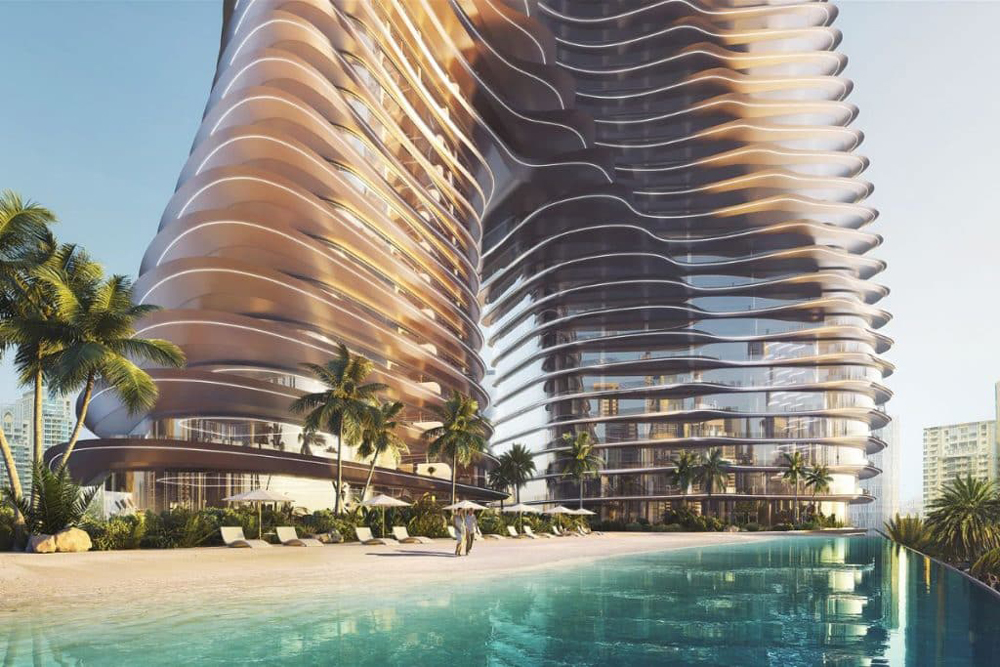Growing Interest in Dubai’s Branded Residences
An impressive 69% of global high net worth individuals (HNWIs) are keen on owning a branded residential property in Dubai, up from 59% in 2023, as revealed by a recent Knight Frank report.
Knight Frank’s second annual 2024 Destination Dubai report highlights that non-GCC-based HNWIs show more interest in buying a branded residence in Dubai (83%) compared to GCC-based HNWI expats (46%).
The report is based on a survey of 317 HNWIs—217 globally and 100 GCC-based HNWI expats—who collectively have a net worth of $5.4 billion and own 1,149 homes worldwide.
Lars Jung-Larsen, a partner specializing in luxury brands for the Middle East and North Africa (MENA), noted, “Branded residences offer access to a luxury lifestyle now synonymous with Dubai. Luxury brands like the Ritz Carlton, Bulgari, Dorchester Collection, and the Four Seasons are capitalizing on this demand. The depth of demand is reflected in the record Dh16,283 per square foot for a 6-bedroom Bulgari Ocean villa in summer 2022.”
A key feature of Dubai’s third freehold residential market cycle is the increase in purchases by genuine end users, such as those seeking second or holiday homes, which also extends to the city’s branded residential market.
Faisal Durrani, head of research for MENA, pointed out, “14% of HNWIs want a branded residence as their main home, rising to 22% among those with a net worth over $15 million. This mirrors our findings that the ultra-high-net-worth community is particularly interested in Dubai’s most expensive homes, using them as one of their many global bases. Additionally, 23% of HNWIs would use a branded residence in Dubai as a holiday or second home, while 12% see it as a retirement home.”
High Expectations for Value Appreciation
Knight Frank reports that 36% of HNWIs expect branded residential property values in Dubai to increase by 5-10% within the first year. This expectation is highest among those with a net worth of $10-15 million (50%). Additionally, 30% of GCC-based HNWIs, expats, and global HNWIs anticipate a 10-15% price rise within the next 12 months.
Durrani added, “The expectation for strong price appreciation of branded residences is likely linked to the premium they command—86% compared to the rest of the market, against a global average of 30%.”
This premium pricing is justified by added features such as security, facilities, services, quality assurance, ease of rental, and the “lock up and leave” nature of well-managed properties. However, developers need to justify this premium amid increasing competition.
Jung-Larsen explained, “The appeal of ‘owning a part of a hotel’ with full access to its amenities in a private environment sets branded residences apart for the ultra-rich. The next differentiation could come from non-hospitality brands like fashion, jewelry, or automotive, offering buyers the chance to ‘live the brand’ 24/7 with branded furniture, decor, amenities, hospitality partnerships, tailor-made services, and exclusive benefits.”
Knight Frank’s analysis shows that for those with a net worth over $15 million, ‘service provision and physical amenities’ are the most important factors (75%), followed by ‘brand identity’ (63%).
Spending Trends
Shehzad Jamal, a partner in strategy and consultancy for the Middle East and Africa, noted, “Branded residences provide an easy way to access the ‘Dubai Life,’ often accompanied by world-class facilities and amenities from adjacent luxe hotels. Owners also benefit from top-notch property management, crucial for non-residents wanting assurance their asset is well cared for.”
Knight Frank found that most GCC-based expat HNWIs prefer to spend modestly on branded residences in Dubai, with 91% planning to spend between $600-999 per square foot. Their average budget is just under $950 per square foot. Conversely, global HNWIs are more likely to spend over $5,000 per square foot on a branded home in Dubai, with nearly 17% willing to do so. This figure rises to 23% for those with personal wealth over $20 million.
